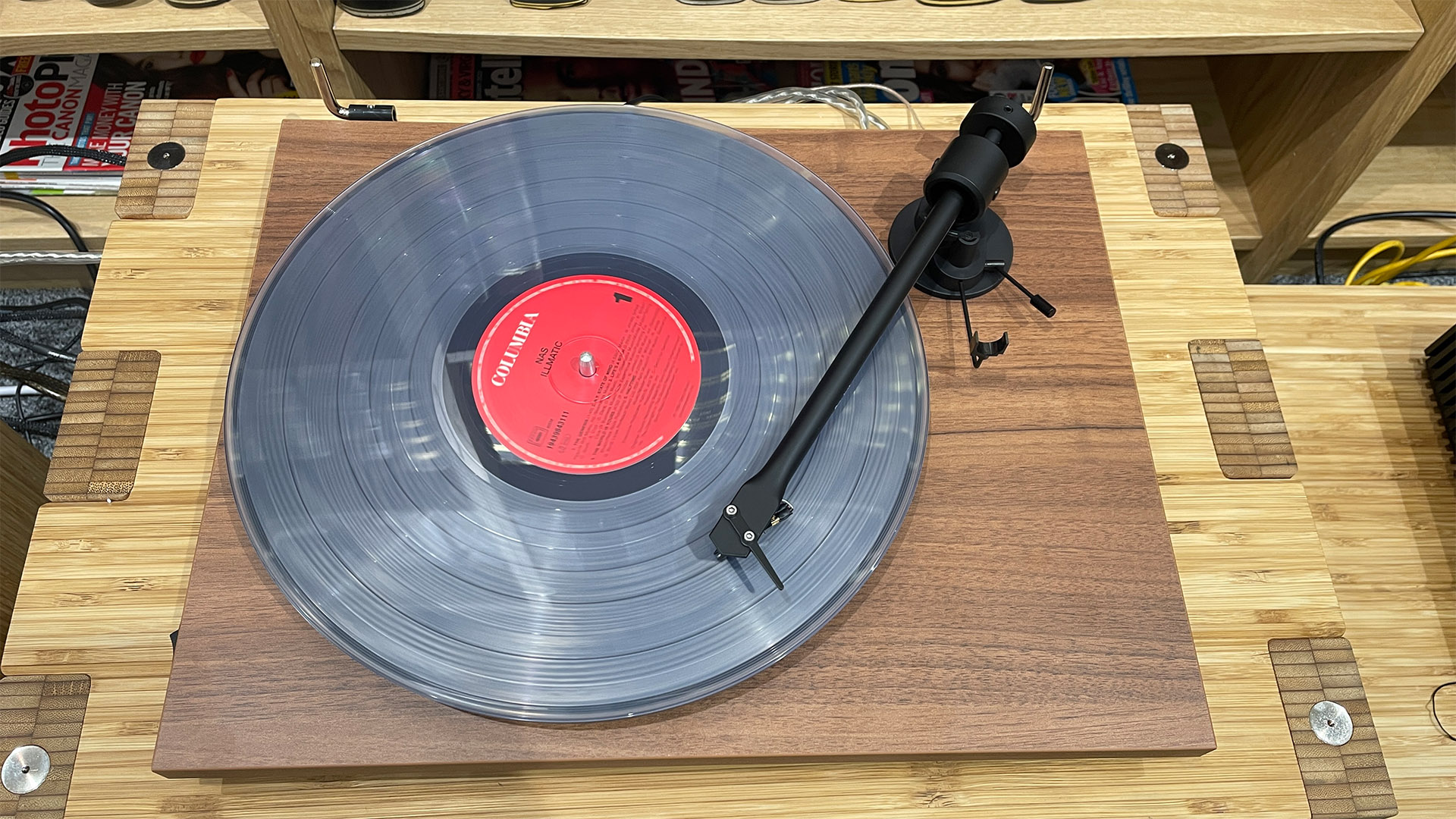Sharp's Samsung deal: sell-out or salvation?

Seems there's been some hostility in Japan to the recent deal struck between ailing electronics manufacturer Sharp and its huge South Korean rival (and now partner), Samsung.
The Twittering classes and Japanese Facebookworms took to their keyboards to make clear their displeasure at the deal, which net Sharp an investment of ¥10.4bn (around £74m) in return for handing over a 3% stake to Samsung.
Follow the Samsung Galaxy S4 launch event live!
Comments were made such as 'Sharp is betraying Japan' – in some sectors of Japanese society, there's not a lot of love for Korea – and even Sharp's own Tweetwrangler comment on the official @sharp_jp account that 'I think I understand that there are many people who feel that one of the reasons for supporting (Sharp) has been lost.'
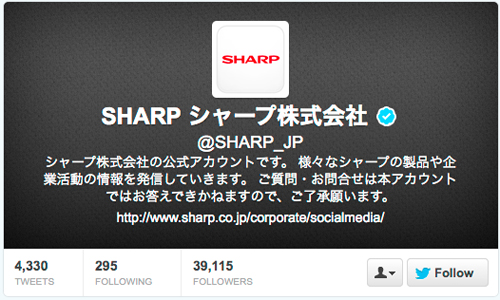
That comment provoked more tweets, and a clarification from Sharp that while the account is official, tweets made on it shouldn't be seen as official company statements. That's all clear, then – but it didn't stop the Sharp Twittermeister from later tweeting 'Even if you dislike me, please don't dislike Sharp products.'
Trading on tradition
Part of the problem is that Sharp has long traded on its Japaneseness when selling its products to the domestic market, going big on the kimonos and tea-gardens when other companies were pulling in overseas celebrities to push their products.
Get the What Hi-Fi? Newsletter
The latest hi-fi, home cinema and tech news, reviews, buying advice and deals, direct to your inbox.
(Incidentally, in an interesting bit of reverse-engineering, Sharp used Star Trek veteran George Takei, born to Japanese American parents, dressed up in a company lab-coat to promote its Quattron TVs outside Japan.
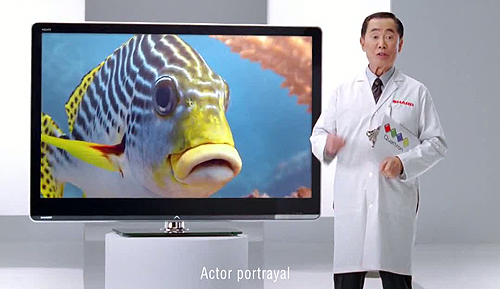
The result is that in Japan, Sharp products have been popular beyond their worldwide reach, with its TVs being a top-ranked buy, and its smartphones similarly selling very well.
To date, the Korean companies haven't made much of an inroad into the Japanese domestic market: Samsung doesn't sell its TVs there, despite being the world's leading TV maker, and LG has only recently started to tackle Japan again with affordable sets (and the roll-out of its 4K and OLED models), having pulled out some time ago.
Spare us some small change?
But the Sharp/Samsung deal looks pretty small in the face of Sharp's current financial situation, even though some sources close to the Japanese company are reported to have said that without it, the company faced going under.
Sharp is expected to book a loss of ¥450bn (£3.15bn) this financial year, some 24% more than its current market capitalisation, and has seen its shares fall from just over ¥600 a year ago to a low of ¥149 back inOctober last year, before settling (for now) around the ¥300 mark.
And that rollercoaster share ride, effectively halving the market value of the company in 12 months, is at the heart of the increasing woes at Sharp.
Hon Hai: opportunity lost?
Last year, with huge debts, it had agreed in principle a deal with Taiwanese company Hon Hai – the parent of Foxconn, and the world's largest contract electronics manufacturer – for a ¥66.9bn (£470m) investment in return for 9.9% of the company.
However, that deal was based on a Sharp share price of ¥500 and, as the Sharp stock tumbled, Hon Hai boss Terry Gou sought to renegotiate the deal, suggesting either a smaller injection for the same stake, or the same amount of cash in return for a larger shareholding, which would have given him more say in the running of the company.
Sharp, however, seems to have stuck to its guns, and while reports circulated regarding the possibility of further negotiations, it's emerged that the Japanese company was clinging on to its ¥500 a share principles. Talks towards the deal, set to be concluded in the next couple of weeks, now seem to have stalled completely.
Fuming over a Chinese
On hearing of the Samsung deal, Gou cancelled a meeting he was due to have with Sharp executives in Tokyo last Tuesday, and Japanese press reports say that, while Sharp has sent Hon Hai details of its tie-up with Samsung, Gou has not responded.
Well, he hasn't responded beyond a report that Gou was 'fuming' over the Samsung deal in an Osaka Chinese restaurant last Wednesday, having arrived in Japan for the previous day's meeting, and saying 'No Japanese company has managed to build good working relations with Samsung.'
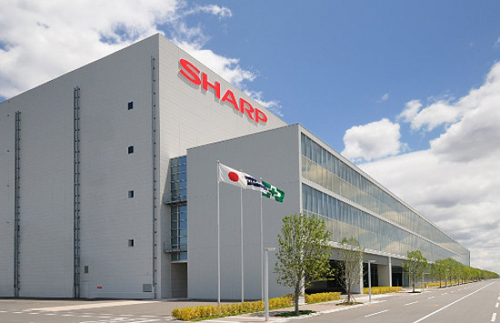
Samsung wanted a stake in Sakai
It looks like Sharp's existing deal with Hon Hai, with which it operates the Sakai LCD TV panel plant (above) following a major deal last summer, will continue: reports suggest Samsung originally suggested it wanted to invest in the plant, but Sharp refused due to the Hon Hai tie-up.

But it's reported things have changed at Sharp's flagship LCD plant at Kameyama, where it makes the world's largest LCD screen, a 108in model, has changed its focus. Here's the 108in TV, by the way – and see what I mean about Japanese imagery being used to sell Sharp products?
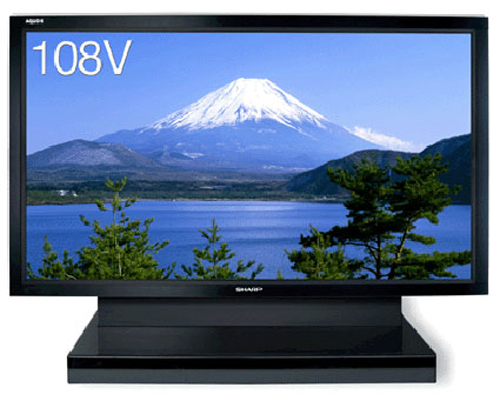
Faced with scaled back output of smartphone and tablet panels (many of which go to Apple), due to falling demand, it's instead ramping up the production of TV panels. For Samsung.
At one point last autumn the plant was down to running at just 30% of capacity, but of late that figure is said to have doubled.
Sharp, meanwhile, seems to be continuing its brinksmanship, pulling in relatively small investments such as that from Samsung, and the ¥4.93bn (£35m) stake agreed with US-based semiconductor giant Qualcomm late last year, in return for 2.64% of Sharp stock – at a price-per-share just over half what Samsung is paying.
Living on the edge
But it remains to be seen how long Sharp can continue to cling on to control of its own destiny without seriously jeopardising its future: arguably, although it has a 100-year history, it's getting near to the point where it can no longer pick and choose its investors.
Nor turn down the size of investment Samsung really wanted to make: Japanese reports say the Korean company was up for pumping in some Y40bn (£280m), but Sharp refused, not least because some at the company were apparently opposed to getting into bed with a company they felt was responsible for its current perilous state.
Hopefully, Sharp's Japanese pride won't presage a fall.
Written by Andrew Everard
Andrew has written about audio and video products for the past 20+ years, and been a consumer journalist for more than 30 years, starting his career on camera magazines. Andrew has contributed to titles including What Hi-Fi?, Gramophone, Jazzwise and Hi-Fi Critic, Hi-Fi News & Record Review and Hi-Fi Choice. I’ve also written for a number of non-specialist and overseas magazines.
